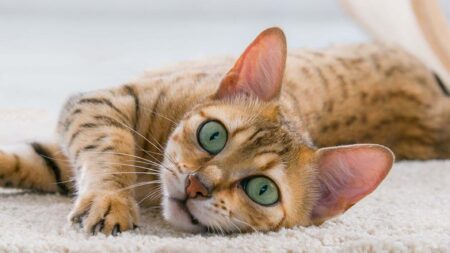
Why Do Cats Meow? 10 Reasons Why
Cats are known for their meows, which are adorable and mysterious to many pet owners. These vocalizations are a form of communication, not just a cute way to greet you when you come home. But why do cats meow in the first place? Well. There are several reasons from simple demands for attention to complex expressions of emotion. So, let’s go into detail about why cats meow and what it might mean when they do.
SEE ALSO: Why Do Cats Sleep So Much? 10 Reasons Why
Why Do Cats Meow? 10 Reasons Why
Here are ten reasons why cats may meow:
- Attention Seeking
- Hunger or Thirst
- Boredom
- Stress or Anxiety
- Sickness or Injury
- Affection
- Greeting
- Alerting to Danger
- Calling to Mates
- Pain or Discomfort
1. Attention Seeking
Attention-seeking is a common reason why cats meow. Cats are social animals and crave interaction with their humans. They have learned that when they meow, it’s likely to get your attention, leading to petting, playtime, or even food.
If you respond to your cat’s meows, they’ll likely continue to meow to get your attention. This can be both a blessing and a curse. On the one hand, it’s a way for your cat to communicate with you and show affection. On the other hand, it can become annoying if your cat is constantly meowing for attention.
2. Hunger or Thirst
Hunger or thirst is another common reason why cats meow. Cats are naturally opportunistic hunters, and they’ve learned that meowing is a great way to get your attention and potentially get fed.
Even if your cat has access to food and water, they may still meow for your attention if they want something different to eat or drink. They might be craving something more savory or flavorful, or they may simply want you to refill their water bowl or switch out their food.
3. Boredom
Cats can get bored just like humans. They may meow to let you know they’re bored and want to engage in some kind of activity.
This is especially true for indoor cats, who don’t have access to the outdoors and all the interesting sights, sounds, and smells that come with it. They may get bored of their toys, scratching post, or the same old routine, and meow to let you know they want something new to do.
4. Stress or Anxiety
Stress and anxiety can cause cats to meow more than usual. Cats are sensitive creatures, and even small changes in their environment or routine can lead to stress and anxiety.
Some common sources of stress and anxiety for cats include:
- Changes in routine, such as a new job or schedule for their owners
- A new pet in the house
- Visitors in the home
- Changes in the home environment, such as redecorating or moving
When cats are stressed or anxious, they may meow more than usual as a way of communicating their distress.
5. Sickness or Injury
Cats may meow to let you know that they’re in pain or discomfort due to an illness or injury.
Some signs that your cat may be sick or injured include:
- Excessive meowing
- Changes in appetite or water intake
- Changes in behavior, such as increased aggression or hiding
- Changes in appearance, such as changes in weight or fur condition
If you notice any of these signs, it’s important to take your cat to the vet for a check-up.
6. Affection
Cats meow to show affection for their owners just as much as they meow for attention. They may meow to let you know they love you, to show appreciation for something you’ve done, or just to express their happiness at being in your company.
Some signs that your cat is showing affection through meowing include:
- Purring: Cats often purr while they meow, which is a sign of contentment and happiness.
- Rubbing: Cats may rub up against you or your legs while meowing, which is a sign of affection.
- Trilling: Cats may trill while meowing, which is a high-pitched, chirping sound that is often a sign of affection.
- Body Language: Cats may arch their backs and extend their tails while meowing, which is a sign of contentment and affection.
- Following: Cats may follow you around the house while meowing, which is a sign that they enjoy your company and want to be near you.
All of these signs are indications that your cat is meowing out of love and affection, and not just to get something from you.
7. Greeting
Cats may meow as a way of greeting their owners or other cats.
Cats have a complex social hierarchy, and meowing is a way for them to communicate their position within that hierarchy. For example, a subordinate cat may meow to greet a dominant cat and show deference.
Cats may also meow as a way of greeting their owners when they return home. This can be a way of showing affection and letting you know that they’re glad to see you.
Some signs that your cat is meowing as a greeting include:
- Approaching: Cats may approach you while meowing, which is a sign that they want to greet you.
- Tail Position: Cats may hold their tails high and straight while meowing, which is a sign of confidence and a desire to communicate.
- Vocalization: Cats may meow in a specific way when greeting you, such as a high-pitched, trilling meow.
- Body Language: Cats may rub up against you or your legs while meowing, which is a sign of greeting and affection.
8. Alerting to Danger
Cats have a keen sense of hearing and can detect sounds that humans cannot. This makes them excellent at alerting their owners to potential danger.
Cats may meow to alert you to the presence of a stranger or intruder. They may also meow to alert you to other dangers, such as a fire or smoke.
When cats meow to alert you to danger, they may use specific vocalizations or body language to communicate the urgency of the situation.
For example, cats may meow loudly and repeatedly when they sense danger.
9. Calling to Mates
Cats may meow to call for a mate, especially during mating season.
Male cats, or tomcats, will often meow loudly and repeatedly to attract the attention of female cats, or queens. This is called “calling” or “yowling” and can be a nuisance to nearby humans.
Female cats may also meow during mating season, but they typically use a softer, more high-pitched meow than male cats.
Some signs that your cat is meowing to call for a mate include:
- Increased Activity: Cats may become more active during mating season, including increased meowing.
- Territorial Behavior: Male cats may mark their territory with urine, which can be accompanied by meowing.
- Increased Vocalization: Cats may meow more loudly and frequently during mating season.
- Aggression: Male cats may become more aggressive during mating season and may meow to assert dominance over other males.
If you have an unneutered or unspayed cat, it’s important to be aware of the signs of mating season and to take steps to prevent unwanted litter of kittens.
10. Pain or Discomfort
Cats may meow to let you know that they’re in pain or discomfort.
Cats are notoriously stoic animals and may not show obvious signs of pain or discomfort. However, they may meow to let you know that something is wrong.
Some signs that your cat is meowing due to pain or discomfort include:
- Change in Behavior: Your cat may become more withdrawn or irritable if they’re in pain.
- Changes in Posture: Your cat may adopt a hunched or guarded posture if they’re in pain.
- Changes in Activity Level: Your cat may become less active if they’re in pain.
- Changes in Eating and Drinking: Your cat may lose their appetite or drink more or less water than usual if they’re in pain.
- Vocalization: Your cat may meow more frequently or loudly if they’re in pain.
- Sudden Aggression: Your cat may become aggressive if they’re in pain and may lash out at you or other animals in your home.
If you suspect that your cat is in pain, it’s important to take them to the vet for a check-up.
What is The Main Reason A Cat Meows?
While cats meow for a variety of reasons, the main reason is communication. Cats use meowing as a way to communicate with humans and other animals.
Meowing allows cats to express their needs and wants to their owners, whether that’s for food, water, attention, or something else. It’s important to pay attention to your cat’s meows and to learn to understand what they’re trying to tell you.
Meowing can also be a way for cats to communicate with other cats, particularly in social situations such as mating season or territorial disputes.
Why Does My Cat Meow At Me When I Pet Her?
If your cat meows when you pet her, it’s likely a sign of affection. Cats often meow to show their affection for their owners and to communicate their enjoyment of being petted.
When you pet your cat, she may meow as a way of saying “thank you” or “I like that!” This is especially true if she’s purring or rubbing against you while meowing.
Some cats may also meow as a way of asking for more petting. If your cat meows when you stop petting her, it could be a sign that she wants you to continue.
SEE ALSO: How to Make Your Dog Get Along With Your Girlfriend?
FAQs:
Q. What do your cat’s meows mean?
The meaning of your cat’s meows can vary depending on the context, but here are some general meanings:
- Greeting: A short, high-pitched meow is often a greeting.
- Demand: A loud, insistent meow is often a demand for food, water, or attention.
- Affection: A soft, trilling meow is often a sign of affection.
- Distress: A drawn-out, wailing meow is often a sign of distress.
Q. Why do cats like meow?
Cats like to meow because it is their way of communicating with us. It allows them to express their needs, emotions, and desires. In a way, it is their way of talking to us.
Q. Are cats talking to you when they meow?
Yes, cats are indeed talking to you when they meow. It is their way of communicating with you, whether they are asking for food, expressing affection, or just wanting to say hello.


